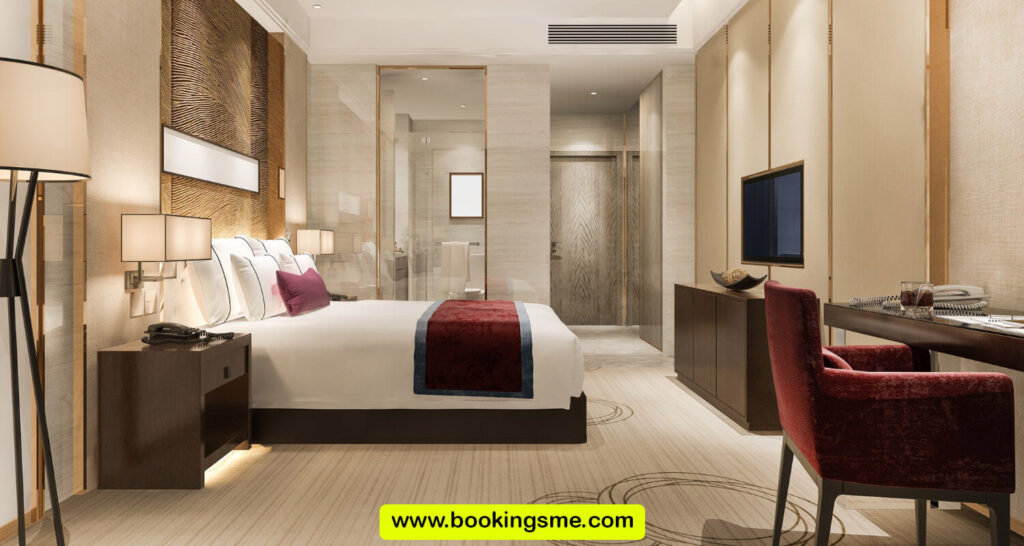Ever wondered how hotels can accommodate large groups of guests gathered for weddings, conferences or other events while providing a room to each individual traveler? It involves a very fine-tuned process known as room block management. What is a very common word in the hospitality world and how important this really is?
Room block management is the process of holding a number of hotel rooms for a group related to an event. This may seem simple, but in all actuality it is quite a balancing act to cater to the group while driving maximal hotel revenues and providing an exceptional experience for both groups as well as individual guests. A closer look at room block management how that can make or break an event.
Read also: Can You Use Hotel Collection Oils In Regular Diffuser
Understanding the Basics
A room block is the entire group of hotel rooms held aside for guests under a specific name or code (usually someone’s last name). The hotel negotiates a price for those rooms and generally has access to them for set amount of time, after which the rooms could be out back onto an open inventory.
Types of Room Blocks:
To properly manage your room blocks you must first understand the different types of room blocks available.
- Contracted Blocks: These are contracted blocks, and essentially, event organizers have agreed to a percentage of rooms that they must fill (or pay for unused) through contract.
- Courtesy Blocks: In these situations the event organizer has no financial obligation. They will allot an specific amount of rooms to the hotel for a date range but only charge if at least one non-reserved room is sold.
- Guaranteed Blocks: Just like with contracted blocks, guarannteed blockgs requrie deposits or credit cards to hold the room. In addition, if the rooms go unbooked then that deposit can be lost or attract a penalty to the organizing body.
How Room Block Management Works
The Process of Managing Room Blocks:
Planning and executing a room block is an effort that starts with working together to identify the ideal number to agree on terms for both you as well as the hotel. It involves:
- Identifying the group’s needs: Understanding needs of thegoing out there group: How many rooms required. Single, double, suite rooms? How long is the stay? Announcing room rates, cancellation policy and any group perks or incentives.
- Monitoring bookings: Tracking reservations against the block to meet group expectations and making necessary adjustments.
- Block release date: Returns all unbooked rooms to the hotel’s inventory by a specific pre-negotiated date in order limit financial exposure.
Key Stakeholders Involved
Room block handling to resolve Room Block is a multitier process where multiple parties are involved with their own set of roles and responsibilities:
- Event Planners: They work with the hotel on negotiating, track reservations and ensure block meets group requirements.
- Hotel Management: They control the room availability, enforce all terms and execute co-operations with other departments to provide smooth experience.
- Guests: These are the end-users of rooms who are ideally satisfied through successful room block management.
Benefits of Efficient Room Block Management
Well-managed room blocks are beneficial for the event planners, hotel and guests.
- Better Guest Experience:
Proper room block management results in smoother bookings for guests, discounted rates and proximity to the event location where possible. Some states have made a legal requirement of this and in other cases, it is done voluntarily that makes the general experience better contributing to success.
- Revenue Optimization for Hotels:
Room block management is critical to driving revenues for hotels. This enables hotels to secure large groups ahead and forecast their occupancy level, thus better optimize pricing strategy. Moreover, it decreases late cancellation and underbooking risk.
- Effortless Event Planning:
Whether you are an event planner or booking a room block for your event, managing the logistics of planning has never been easier. Not only does this offer a consistent block of rooms, but then can focus on other planning efforts rather than spending time panicking over how to handle the housing part.

Challenges in Room Block Management
Room block management is key to organizing rooming for groups but entails quite a few problems. This can be overbooking or under booking resulting revenue loss, disgruntled guests etc. When event planners, Hotel Management and guests have communication gaps it can lead to misunderstandings and unfulfilled expectations. E.g. an unplanned last-minute change or cancellation unravels best-laid plans with logistical nightmare galore.
Tracking reservations with accuracy and ensuring special requests are kept to keep any issues minimal take carefull attention. But you need savvy planning, effective communication and the adaptability to handle unforeseen circumstances in order to meet these challenges. Taking steps in advance of these problems can alleviate some stress from venues and event planners, allowing guests to get the best experience while others understand how it may be a better business choice.
Best Practices for Room Block Management
Room block management is a best practice and there are certain essentials that needs to be followed for effective operations as well delivering guest satisfaction. It begins with early planning, and accurate forecasting in terms of room allotment that needs to be blocked alongside the reservation rules/ requirements for rates. Create definite contracts stipulating the terms and conditions, also charge / release dates on a determined number of unbooked rooms.
It’s good that you are organizing these things in advance, but the most important is communication as regular updates should happen with both hotel and event planner to update of changes or concerns. Use tech for booking tracking & reminders to decrease human error. You also want some ability to shift as you get closer and closer as the event date approaches. With these practices, you are able to make the process efficient and protect your users as well as help guests and hosts have happy experiences.
Tools and Technologies in Room Block Management
It has completely changed the way we approach room block management in this digital age.
- Optimization of Room Block:
To track bookings and generate reports there are specially designed software that can be used to assist automatically manage various phases of room block management. The features save a lot of time for event planners and hotel staff, help avoid the mistakes inherent in manual paperwork.
- Integrate with Event Planning Tools:
By integrating room block management software with larger event planning tools, every category of activity within the entireactivity is coordinated. This integration facilitates a smooth relation among the various teams and cares for managing an event end to end.
- Benefits of Automation:
There are plenty of ways the hotel room block management can benefit from automation. It streamlines the process significantly and ensures that all system updates and changes are done in real time, minimizing potential human errors or hiccups. With automated reminders and notifications, the user experience is streamlined, using real-time data keeps them all in the loop through any changes in plan or last minute surprises.
The Role of Data in Room Block Management
When it comes to getting the room block management right, data is everything. In theory, hotels and event hosts can see what type of demand there is historically when it comes to bookings so that they know how many room nights are needed. The concept also works for determining pricing strategies and release dates based on previous booking patterns or history in the sector.
The insights will also enable the hotel to predict some of guest behaviour including booking windows and potential cancellations on which it can respond reactively. This results in lower risk of guest dissatisfaction from overbooking or under booking rooms. Not only this but real-time data monitoring makes it easier to root out the issues and provide faster troubleshooting so that there is no mismanagement of resources leading to better results for both, hotel owner as well guests.
Room Block Management for Large Events
ffective room block management for large event types like conferences or conventions, comes with unique set of challenges given the complexity and volume. Arranging accommodations for hundreds if not thousands of guests does take detailed organization and close communication between event planners, hotels. Accommodations including difference in room types, accessibility requirements and distance from the event venue need to be accounted for.
Good management also means carefully observing reservations to avoid overbooking or lack of capacity. Meeting the needs of a diverse range of event attendees by flexing your room blocks will smooth over any travel-arrangement hurdles and prevent them from becoming larger issues that may detract from an otherwise successful event.

Customizing Room Blocks for Different Groups
Depending on the type of event, room block management can change.
- Corporate Events: Business events typically have attendees who require things like being close to meeting rooms, or having access to business facilities. This services to help make a room block is then tailored for his or her needs they will likely spot beauty within the knowledge and just might logon again.
- Weddings: When it comes to weddings, the room block is a crucial part of your planning process. Having the bride, groom and their respective wedding parties means ensuring that they will be able to find perfectly comfortable accommodations. And on such a beautiful occasion where everyone should also have fun in style too! This can mean communicating with the wedding planner to arrange room assignments, handling any special needs of both bride and groom, or assisting as surprises arise.
- Family Reunions: There are few breed of guests as diverse with regard to age and accommodation preference. The type of accommodations required for these events involve room blocks that are linked together but offer some flexibility ensuring families can stay close to one another; Parents/Grandparents can have both bedrooms, etc.
Negotiate Room Block Agreements
Element 1 of event planning negotiating room block agreements, done well means paying attention to the details. With this in mind, event planners should know going into negotiations what their group will actually need how many rooms at what rate and whether there are any other requested accommodations. The agreement should cover essential reminders such as cut-off dates, cancellation policies and flexibility to possible adjustments.
It can result in free rooms or reduced facilities with an added bonus of good negotiation. Looking at these components can help planners create a contract that is good for the event attendees, but also make sense to win over hotels as partners.
Read more: Which Hotels Have Monorail To Disney
Common Mistakes to Avoid in Room Block Management
It is important to prevent some of the common mistakes made in managing a room block. Common errors: Let’s see an even simpler and more reasonable example, what if we forget to register the bookings and then our solution issues many tickets of same flight; it may result in overbooking or under-booking. In this way, if guests come to stay and have special requests (such as accessibility or room type) that are not fulfilled can lead to dissatisfaction.
Failing to understand or comply with cancellation policies can also result in undue costs and lost revenue. Not to mention, poor communication with the hotel or guest can sow chaos and create unintended consequences for all parties. With these potential issues tackled you should be able to improve the efficiency and success of your group booking management.
Impact of Room Block Management on Hotel Revenue
The management of the Room block can greatly affect hotel Total revenue in terms of Occupancy and rate structure. Good management guarantees your hotel a constant stream of group sales leads You receive inquiries regularly, which not only boosts funds to the bottom line but also decreases vulnerability vacancies. A well managed room block makes it possible for hotels to optimise their price knowledge and forecast correctly supply demands.
Conversely, bad management can result in a lack of revenue by overbooking flights and hotel rooms with tour operator passengers or by under booking coach travellers, saying no to bookers who are great DMC clients: individual business. Optimizing refunds will lead to the increase of both group and transient business balances, contributing to total hotel profitability.
Trends in Room Block Managemen
This industry is constantly changing and the process of room block management evolved just as everything else.
- What to Look for in Vendor Room Block Software: Sustainability in room block managementWhile sustainability is becoming more of a priority across some industries. From digital check-ins to eco-friendly amenities for group bookings, hotels and event planners are looking at ways striving towards a green convention center of the future.
- Dealing with Changes in the Travel Industry: Everything changes fast when it comes to travel – consumer preferences, world events that affect your ability or desire to hop on a plane and go somewhere. It’s important to adjust your room block management strategies according to these changes.
- The Future: Innovations in technology and data will take many of the head-aches out of managing your room block going forward. FUTURE OF ROOM BLOCK MANAGEMENT More automated, faster and more guest centric with AI powered booking tools to personalized experiences.
Conclusion
The management of room blocks is a key part of the hospitality industry, and it must be planned for in advance, with timely communications that ensure adherence to service standards. Event planners trying to secure the best places for their attendees, and hotel managers looking to maximize revenue: you know that managing room blocks is crucial. You can make sure your room block management strategy is a success by following best practices, using technology and staying flexible.
What needs to be in a room block contract?
Room Block Contracts A room block contract will include the following: Size of block, Room rates (with NET or COMMISSION calculation) Cut-off dates for reservations, Cancellation policies Perks/Incentives Additionally, one should look for flexibility clause.
Why is Room Block Management and Early Planning so Important?
With sufficient time to plan, budget accurately can forecast more effectively, towere better contract terms with hotels and improved chances of getting the necessary number + type rooms reserved at competitive pricing.
What affects Guest Experience with your Room Block Managements?
When handled properly, room block management helps deliver guests through the purchasing process and provides them with favored rates & convenience of staying on-site during an event which leads to a more pleasurable experience.



